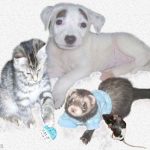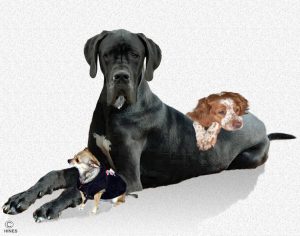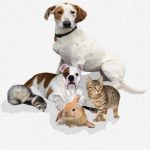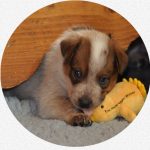The Best Dog Breeds For You And Your Family – From A Veterinarian’s Perspective
Ron Hines DVM PhD

Asiatic Terriers:
These dogs generally have loving personalities. I personally do not find them as intelligent as non-Asiatic terriers, but then people do not have pets for their intelligence and their owners love them dearly. My biggest concern with this group is that their life span is often shorter than other terriers (10-13 years) and that virtually all of them go blind. They also have a higher than normal propensity (likelihood) for ear infections and seborrheic dermatitis. Pekingese Lhasa Apso Shih Tzu Pug (Mopshund) Japanese ChinFighting Dogs:
This is a perplexing group of dogs to comment on. The majority of them are loving pets with adults and children. The problem is that when they go awry, there are exceptionally dangerous because when they bite, they lock their jaws and will not release. They also have the inclination to lose their loving nature when they enter a pack of dogs more aggressive than themselves. Exceptions are boxers bulldogs and Bostons, who seem to have lost their fighting and negative traits. Do not purchase puppies when either parent is aloof or distrusting! Do not purchase them from owners who fight their dogs. If you purchase one of these breeds, accept the fact that it may never get on well with other dogs and may eat cats, birds, etc. Alapaha Blue Blood Bulldog American Pit Bull Terrier (Pit Bull Terrier) American Staffordshire Terrier (Bull Terrier, Pit Bull) American Bulldog Boxer English Bull Mastiff English Bulldog Olde Bulldog Boston Terrier French BulldogGuard Dogs:
These dogs are just what their name implies. They guard you and your children from perceived threats by biting. A good-tempered dog of this class will differentiate the mailman, garbage man your guests, relatives, your children’s wild playmates and veterinarian from burglars, unfortunately some make the wrong decision. You need to be strongly assertive and in charge with these breeds, so they look to you for decisions regarding strangers. If your wife or husband is passive or submissive to dogs, do not purchase one of these breeds. Passive or submissive people rarely overcome this problem by attending dog obedience school. The German shepherd is one of the most intelligent of dogs. When purchasing one of these breeds, try not to obtain a pup from parents that are too large. Play close attention to the gait of the parents because all of these breeds have a tendency to hip dysplasia or, better yet, from parents that have been certified dysplasia free. Some of these dogs have aggressive temperaments that make them undesirable as pets. Chow Chows, Akitas Great Danes and large Rottweilers are not known for their long life span. With the exception of Danes and Alsatians, these dogs are also prone to eyelid defects. Be sure to check the parent’s eyes for mattering, inflammation squinting and infection and ask if corrective eyelid surgery was performed on either parent. Be sure the parents hair coats are glossy, no bald patches are present, and the coat is odor free. German Shepherd (Alsatian) Great Dane Rottweiler Chow Chow Akita Inu Akita Asian Mastiff Deense Mastiff Great Dane English Mastiff Malinois Pyrenese Mastiff Shar-Pei Tibetian Mastiff Argentinean DogoGiant Breeds:
I would not purchase a puppy of this group from any operation with over six females. I particularly like breeders that work their dogs in field trials, search and rescue, etc. Giant breeds that do not come from puppy mills or through pet shops tend to have wonderful personalities. The size of these dogs can make them a poor choice if you do not have adequate room for them. Be sure that the parents are not aggressive! My biggest concern with giant breeds that that they age so rapidly, reach senility sooner than smaller breeds and have such an abbreviated life span. If this doesn’t bother you, purchase one. Great Dane Great Pyrenees Saint Bernard Greater Swiss Mountain Dog Bernese Mountain Dog Several readers have inquired why I did not mention Neapolitan Mastiffs. This is because, although it is an ancient breed, it was an uncommon pet in the US until quite recently. First, I must say that there are great individuals within any breed – but these individuals may not be the norm for the breed. Also, bloodlines within a breed differ greatly in personality. No matter what breed you choose, insist on interacting with both parents of the puppy that you are considering. Accept NO excuses from the breeder. Never purchase any dog sight unseen. Be cautious of dogs that were sold and then returned to the breeder. Neapolitan Mastiffs were bred to be aggressive guardians and protectors of their owners and their possessions. Unfortunately, the limited experience I have had with this breed has been negative. However, the dogs I examined were brought to me because of aggression and dominance problems, as well as for quarantine after biting strangers. They may not have been characteristic of all Neos. I had to destroy two of these dogs when I could not modify their behavior, and I hate to put down animals. My chief concern is the temperament of the breed. They were specifically bred to be large, powerful, threatening and suspicious. They have an enormously powerful bite. When they attack, they can be lethal to other pets or humans. Some kill cats – or dogs of their same-sex. Secondly, I have found that among larger breeds, the more the breed differs from the shepherd/wolf norm, the more likely it is to have health problems and a shorter life. I also do not suggest that pet lovers ever purchase a breed that is currently trendy and in vogue. Often these “hot” breeds have “feet of clay” and rapidly fall out of favor. Tried and true breeds are true for a reason. Minor problems with Neos are shedding, snorting, snoring, slobbering, drooling, gassiness and eye problems associated with loose and excessive facial skin. Like all giant breeds, they die quite young and are prone to arthritis. They do not tolerate heat well. If you have your heart set on this breed, realize that you may lose some of your friends, have problems obtaining home liability insurance and incur the animosity of fearful neighbors. Definitely do not purchase or accept a Neo if you and your spouse are not dominant, assertive personalities. You will be safer purchasing a Neo that is three years old or older because you can evaluate its adult personality before you accept it.Miscellaneous Toy Breeds:
These are all intelligent, loving breeds with a propensity to become spoiled rotten. More than half my clients sleep with their toy breeds, and most share their meals with their owners. They make wonderful companions – but will take advantage of you if you let them. They quickly learn the limits and borders of their behavior and generally mature out they way you want them. American Hairless Pomeranian Maltese Chihuahua Papillon Miniature Poodle Toy Poodle Schipperke Bichon Keeshound Chinese CrestedPinchers:
These are very intelligent and very emotional and active dogs. They tend to good health, but may be snappy around children. They do not do well when both owners work and the dog is forced to spend its days alone. They tend to have good coats with minimal oil and a minimum of breed-related diseases. Affenpinscher Doberman Pincher Manchester Terrier Miniature Pinscher German Pinscher Miniature PinscherPointers:
Pointers are often kept by owners who hunt them. Hunters tend to be practical people who do not put up with bad behavior or poor health. If you can, purchase from a hunter, hunting club or field trial aficionado. Pointers are not the world’s most intelligent dogs, but they go the extra mile to please their owners and are loving and affectionate. German Pointer (Deuche Staande Hund) English Pointer (Engelse Pointer) Portugese Pointer (Perdigueiro)Scent Hounds:
The same general points that were made for Pointers apply to Scent Hounds. These are hunting dogs that follow the scent or spoor of game. Unless purchased from hunting sources, they tend to have more allergic skin diseases than other breeds, so be sure that both parents are over 2.5 yrs old and have good coats. They tend to be very vocal, so be sure your neighbors are either deaf or understanding. Basset Hound Blue Tick Hound Walker Hound Beagle American Foxhound Catahoula Leopard Dog Dachshund Deerhound Blood Hound English Foxhound Swedish FoxhoundSchnauzers:
These are exceptionally intelligent, long-lived and desirable pets. They shed very little and do not have oily coats. Certain lines do have more allergic skin disease and allergies to vaccinations than dogs in general. So be sure to check the status of both parents. They tend to be closely attuned to their owners. When the owners are nervous or depressed, these dogs will be too. Miniature Schnauzer Standard Schnauzer Giant SchnauzerSetters:
Because setters are used to flush game birds, they tend to be hyperactive. This is not a problem if you are a “setter or spaniel person”. There is just a lot of tugging at the leash, jumping up on the owners and slobbering going on. Setters, pointers and spaniels have similar intelligence. They have slightly more than the average number of allergic skin complaints. Some of these skin problems are food allergies, but more relate to dusts and pollen in the air. They require a lot of skin care and grooming. Irish Setter English Setter Gordon SetterSight Hounds:
These tend to be happy, affectionate, non-aggressive pets. The long-haired varieties, such as Afghans, require a lot of grooming time. Many result from small show-circuit gene pools, so the health of the parents is doubly important. Of the group, greyhounds obtained as “racing culls” have the best health and sweetest nature. Afghan Hound (Afgaanese Windhond) Basenji Borzoi (Russian Wolf Hound) Elkhound Irish Wolfhound Whippet Italian Greyhound Pharo Hound SalukiSpaniels:
See my comments on setters. Spaniels are quite like setters. They do tend to suffer from chronic ear infections, so check both parents out for reddened, musty-smelling or discolored ear canals. Again, the “rarer” spaniels have small gene pools, which makes them more susceptible to genetic diseases. American Cocker Spaniel English Cocker Spaniel American Water Spaniel Cavalier King Charles Spaniel (Toy Spaniel) Brittany Spaniel Field Spaniel Irish Water Spaniel English Toy Spaniel Sussex Spaniel Springer Spaniel (English Springer) Springer Spaniel (Welsh Springer Spaniel) Tibetan Spaniel Welsh Springer SpanielTerriers:
Like schnauzers, these are exceptionally intelligent, long-lived and desirable pets. They shed very little and do not have oily coats. Also like schnauzers, certain lines do have more allergic skin disease and allergies to vaccinations than dogs in general. They also seem to have a greater incidence of epilepsy. So be sure to check the status of both parents. They tend to be closely attuned to their owners. When the owners are nervous or depressed, these dogs will be too. Most of mine have trained their owner into giving them people rather than dog food. These dogs will lose their teeth and develop strong bad breath unless you brush their teeth or have a veterinarian clean them every year. Aberdeen Terrier Airedale Terrier Australian Terrier Dandie Dinmont Terrier Fox Terrier Wirehair Fox Terrier Silky Terrier Maltese Terrier Yorkshire Terrier Jack Russell Terrier Kerry Blue Terrier Lakeland Terrier Manchester Terrier Pit Bull Terrier Patterdale Terrier Portugese Terrier Pointer Rat Terrier Scottish Terrier (Aberdeen Terrier) Sealyham Terrier Tchiorny Terrier Tenterfield Terrier Skye Terrier Soft Coated Wheaten Terrier Tibetan Terrier Welsh Terrier West Highland White Terrier Black Russian Terrier Cairn Terrier Irish Tgerrier (Terrier) Norfolk Terrier Bedlington TerrierUpland Retrievers:
Because these dogs are still often hunted, their general health and temperaments are good. They have great stamina, mellow dispositions and make great pets. Weimaraner Vizsla Dutch Partridge DogWater Retrievers:
Like the upland retrievers, they are often still hunted, so their general health and temperaments are good. I would not purchase any of these dogs from show breeders – they are selecting for the wrong traits. The exception would be the Standard Poodle because these are rarely hunted. Flat Coated Retriever Chesapeake Bay Retriever Labrador Retriever Golden Retriever Newfoundland Standard Poodle Portugese Waterhound (Water Dog) German Short Hair PointerWorking Dogs:
My suggestion is that anyone living south of Kansas purchase only short-haired dogs. Many of these breeds were bred for cold climates. They suffer greatly in my portion of Florida. A second alternative that few of my clients accept is to have the dogs sheared three times a year. Dalmatians can be shy and distrusting, so check their parents out well. All these breed really try to please their owners. They are quite intelligent but do not live as long as the terriers. Siberian Husky Alaskan Malamute German Shepherd (Alsatian) American Eskimo Dog Spitz Samoyed Dalmatian German Shepherd Dog Samoyed Finnish Spitz Caucasian Mountain Dog Neapolitan Mastiffs Belgian Malinois Old German Shepherd Dog Bernese Mountain Dog Appenzeller Mountain Dog (Cattle Dog) Finnish Lapphound Bouvier des FlandresSheepdog Herders:
Again, many of these dogs have long, oily hair coats, which are unsuitable for hot climates. All the sheepdogs are very active and attune to their owners. They love to please. They are inquisitive and brave. Furthermore, they make excellent pets for children – worrying about them constantly as they formerly worried about the sheep in their charge. Do not pick puppies from parents that are oversized or near the maximum allowable size for the breed. Atlas Sheepdog Australian Shepherd Queensland Blue Heeler American Tkundra Shepherd Anatolian Herder (Analolian Shepherd) Atlas Sheepdog (Aidi) Australian Cattle Dog Australian Shepherd Azores Cattle Dog Dutch Shepherd Dog English Shepherd Dog Ainu Dog Icelandic Sheepdog Belgian Sheepdog Lancashire Heeler Old English Sheepdog Picardische Herder Pyrenese Shepherd Pyrenese Shepherd Old German Shepherd Dog Sheltie (Shetland Sheepdog) Collie (Schotse Herder) Bearded Collie Border Collie Tervuerense Herder (Tervueren) Polish Tatra Sheepdog White Shepherd Dog Yslandse Herdershond Akbash Australian Kelpie Karelian Bear Dog Briards
You are on the Vetspace animal health website
Visiting the products that you see displayed on this website help pay the cost of keeping these articles on the Internet.



